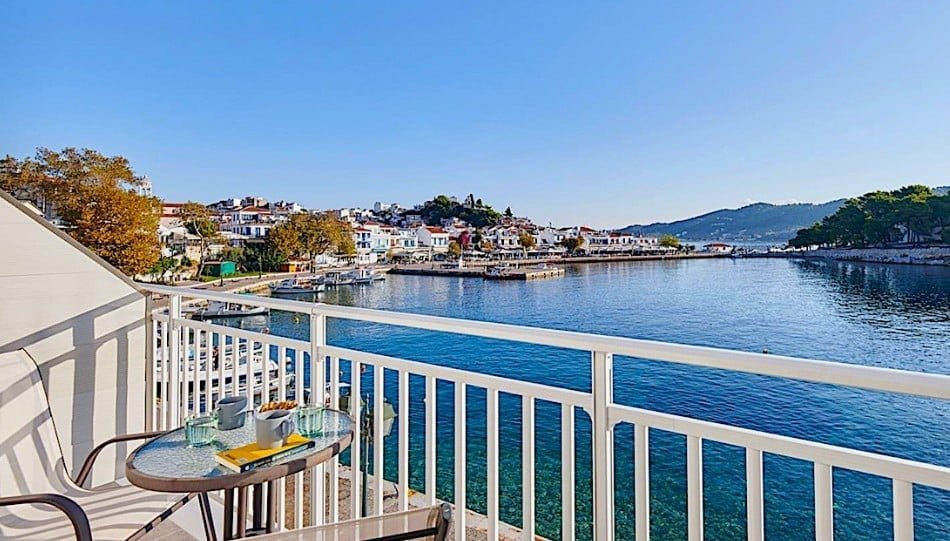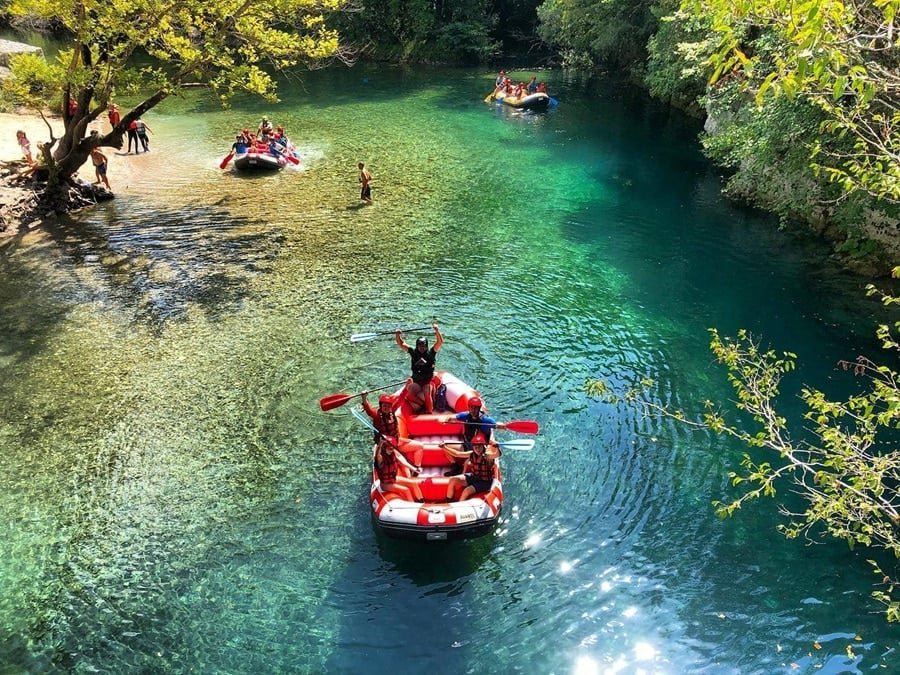
The picturesque Greek island of Skiathos is celebrating another robust tourist season, with officials and local business leaders highlighting a concerted effort to balance increasing visitor numbers with a strategic pivot towards sustainability, enhanced accessibility, and premium quality experiences.
Despite a generally sluggish national tourism recovery, Skiathos appears to be charting its own course, driven by targeted investments and a clear vision for its future.
Impressive tourism momentum on Skiathos
Mayor Thodoris Tzoumas confirmed speaking to Greek Reporter the island’s impressive tourist momentum. “The tourist movement this year has been particularly good,” he stated. “We started with our first international flight at the end of April, and so far, we’ve seen an increase compared to last year, which was already a record year.”
Skiathos anticipates finalizing results by November 2nd, coinciding with the last international flight from London, and boasts direct connections to 24 cities across 13 countries.
The municipality’s proactive approach to promotion is a key driver, with an annual investment of €500,000 in international marketing. This includes advertising campaigns in major European cities like London, Vienna, Stockholm, Paris, and Zurich, aimed at keeping Skiathos’s iconic image top-of-mind for potential visitors. The island welcomes approximately half a million visitors annually.
Connectivity has also seen significant improvements. Beyond the year-round ferry link with Volos, new routes from Agia Konstantina, Thessaloniki, and Mantoudi have made the island more accessible and competitively priced compared to other Aegean shipping hubs.
Pioneering accessibility and combating “hyper-tourism”

A core focus for Skiathos is its unwavering commitment to accessibility. Mayor Tzoumas detailed efforts to “democratize transportation,” expanding bus routes to new areas and, crucially, including access for people with disabilities (AMEA) for the first time.
The island’s dedication to inclusivity has earned international recognition, with Skiathos being showcased as a “good practice” example at the World Tourism Organization’s conference on accessibility and tourism in San Marino in November 2023.
This commitment extends to physical infrastructure, with SEATRAC mechanisms on four beaches allowing independent sea access for individuals with mobility challenges. Increased AMEA parking spaces, new ramps, and a navigation app further underscore the island’s drive to be barrier-free.
Addressing concerns about over-tourism, Mayor Tzoumas firmly stated, “There is no ‘hyper-tourism’ in Skiathos, and discussing it in that way can create a negative impression.”
He acknowledged that July and August consistently see 100% occupancy but emphasized that efforts to open new direct flight destinations like Paris (2022) and Zurich (2021) are strategically aimed at attracting diverse visitor groups interested in walking, cultural tourism, and gastronomy. This strategy is vital for strengthening the shoulder seasons of April, May, September, and October.
“A permanent resident needs to be able to live and thrive in their hometown, and that requires sustained economic activity, not just two or three months of boom,” the Mayor stressed to Greek Reporter, highlighting the importance of extending the tourist season for sustainable local development.
Infrastructure challenges and the quest for quality

Despite the positive outlook, stakeholders acknowledge significant challenges. Dimitris Loumakis, General Manager of Aria Hotels in Skiathos, pointed to “serious pressures on its basic infrastructure this year, especially in the critical water supply and sewage system, which are severely tested during the high season.”
He emphasized the urgent need for “sustainable and organized tourism, based on a clear plan and vision for the future of our island,” and stressed that “Skiathos does not need ‘more’ tourism, but wiser and more responsible management of what it already enjoys.”
Speaking to Greek Reporter, Loumakis also noted an initial drop in visitor flow at the beginning of the season, prompting price adjustments to maintain affordability, with a predicted relative increase for the remainder of July to September.
Akis Tsarouchis, President of Skiathos Hoteliers, echoed the sentiment of a generally sluggish national tourism landscape but highlighted Skiathos’s resilience due to “the shift to quality, driven by investments and the passion of the new generation of entrepreneurs.” He reported an increase in arrivals for April (3.65%), May (4.28%), and June (10.43%) compared to 2024, with forward bookings suggesting this trend will continue.
However, Tsarouchis raised a critical point: “increases in arrivals are no longer related to turnover or the result of use, but only to the wear and tear of the facilities.” He advocated for a focus on the “quality of arrivals” over mere quantity, underscoring the importance of attracting a visitor profile that appreciates and contributes to the island’s upgraded offerings.
Evolving visitor profile on Skiathos and market shifts

The profile of the Greek visitor, and by extension Skiathos’s visitor, has evolved. Tsarouchis observed that European visitors, traditionally the backbone of Greek tourism, have seen a decline in purchasing power. Destinations that diversified into markets like China, India, America, Russia, and the Emirates have fared better. He also noted a national “inadequacy of tourism policy” in addressing this shift, as “good” European visitors now have more competitive alternatives globally.
The rise of short-term rentals also presents a challenge, as these visitors often exhibit behavior that generates less revenue for local tourism businesses, opting to cook in their accommodations and spend time by private pools.
Investing in excellence: A competitive edge
Despite these hurdles, Skiathos hoteliers are continuously investing in quality. “A key vehicle driving the shift in the quality of the island is the continuous investments by hoteliers with the aim of offering a high level of hospitality,” Tsarouchis affirmed. This includes both building and infrastructure upgrades, but primarily focuses on elevating the level of service within hotels and the island’s catering sector, which is now at an “extremely good level.” This creates a “beautifully competitive environment that ultimately benefits the visitor.”
He argued that Skiathos offers excellent value for money. “Skiathos is relatively economical compared to most islands for what it offers. The visitor, through the many choices he has for his transfer, his accommodation, his food and his entertainment, can move within the framework of his budget.” Timely planning and early booking can make the destination even more economical. Furthermore, the island’s natural beauty, stunning beaches, forests, picturesque charm, history, and culture are enjoyed “for free,” giving Skiathos a significant comparative advantage.
To further strengthen tourism, stakeholders call for more targeted and measurable marketing efforts. “The Municipality is seriously investing in tourism promotion, but it is not enough to just advertise,” Tsarouchis advised. He urged setting “measurable business goals and use marketing as a tool to achieve them,” followed by evaluation and continuous improvement. This strategic approach, he believes, should be adopted at a national level for Greece’s tourism product.
Related: Skiathos: A Tapestry of History, Forests, Beaches, and the Iconic Airport


